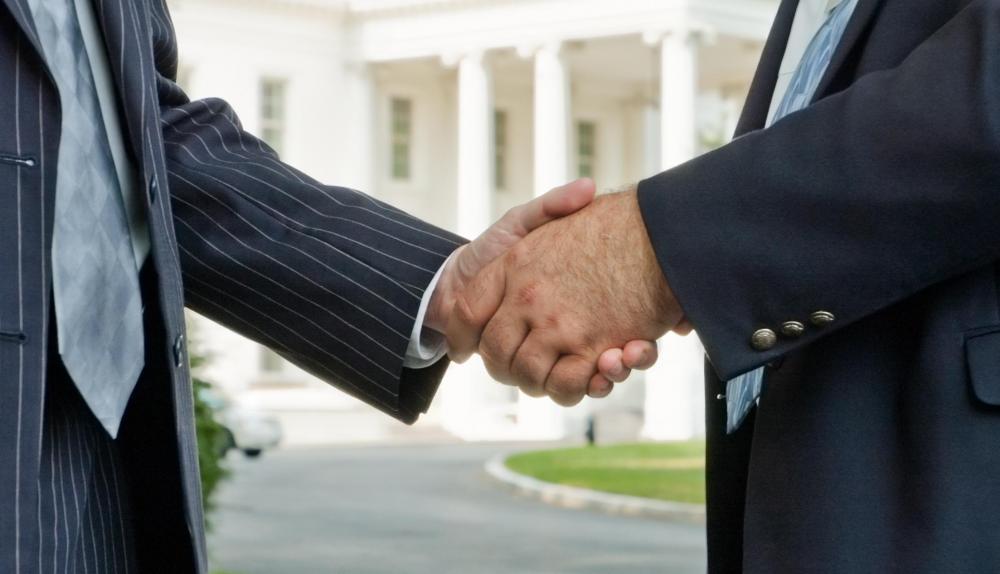At WiseGEEK, we're committed to delivering accurate, trustworthy information. Our expert-authored content is rigorously fact-checked and sourced from credible authorities. Discover how we uphold the highest standards in providing you with reliable knowledge.
What is Trade Negotiation?
Trade negotiation is a process in which nations meet together to discuss the possibility of trade, with the goal of reaching a trade agreement. Both nations have a vested interest in negotiating a successful trade agreement because it has the potential of promoting economic growth and allowing companies to expand their markets, but both are also concerned with protecting their economy and safety. Trade negotiations can become quite complex, and may involve more than two nations, along with moderators who take a neutral stance to help the countries reach an agreement.
International trade is one of the backbones of almost every economy in the world. While many companies do thriving business domestically, the ability to expand into international markets is critical. Nations also count on international trade to access goods and service which cannot be produced domestically, and to export goods and services which they know other nations want. For example, if a country cannot produce silk, it needs to be able to obtain silk from another nation in order to meet the demand for silk within its borders.

During a trade negotiation, representatives of nations interested in trading with each other meet to discuss the terms of those trades. Issues such as tariffs and taxes, holding periods for goods, and trade restrictions may be discussed. Nations may also be concerned with topics such as public health or food safety which might be impacted through foreign trade. For example, a country with no history of bovine spongiform encephalitis, also known as mad cow disease, might state that it is not willing to import beef products from a country with a history of this disease, due to concerns about contamination.

All sides may be obligated to make concessions during a trade negotiation to make a deal which will work out well for everyone involved. A nation which sends representatives with good negotiation skills can strike a trade agreement which will be highly beneficial, while negotiators who are not good at the delicate dance of international negotiations may return to their home nations with a less favorable deal.
Although a trade negotiation meeting is technically about trade, some nations use it for other types of political negotiations. For example, a nation concerned about the environmental record of another nation might push that nation during a trade negotiation session to make policy changes by withholding a trade agreement until those changes are made. Likewise, a nation which wants other political concessions may threaten to revoke or refuse a trade agreement until these political terms are met.
AS FEATURED ON:
AS FEATURED ON:












Discussion Comments
How does one really apply critical thinking to trade negotiation?
That's interesting. I didn't know that there can be political negotiation during trade negotiations. It would make sense if countries used the negotiations as an opportunity to discuss political issues with one another. But requiring a country to make certain changes before signing a trade agreement does not seem too right to me. It's basically a threat.
I honestly don't believe that politics or ideology has a place in trade. Trade is not a luxury, it is a need. We all need to buy things that we don't have from others. Why would we want to risk a trade negotiation by pulling politics into it?
But I know that this is how it is. That's why countries impose embargoes on one another when they can't get along. But you know, it's the people that suffer at the end of the day. Trade is in the benefit of everyone and I think negotiations should be undertaken with this intent in mind and nothing else.
What do you think? Does politics have a place in trade negotiations?
I read an article in the news the other day which mentioned that developing countries generally get the least favorable deals when it comes to trade negotiations.
I was surprised by this because I think that developed countries should be helping out developing countries. Of course not so that they would be losing money from trade. But an unfavorable trade agreement would put a developing nation at a much worse position than before.
Why can't developed countries offer developing nations duty free imports during negotiations and make it easier for them to access their markets? They could also reduce regulations on goods that do not pose any health or security concerns. I think developing nations deserve these acts of goodwill during trade negotiations. We could help them get out of poverty.
I had no idea that trade negotiation is such a huge process. I learned in class that it's a multi-step process and there are dealings between countries both before and after the negotiation.
Like for example, before the actual negotiations start, countries assess each other and talk to one another about each others' policies, the details on logistics and finances of how the trade would take place if an agreement is reached and even regional issues.
During the negotiation, there is all sorts of consultation going on on both sides about how they can benefit from the agreement and what the consequences of the agreement will be for them. I think they also have to have different options and alternatives ready to go in case there are disagreements.
If the countries agree on a trade agreement, then there is a post-negotiation phase too. This is where everything is implemented and then shared with the other countries. There might be an international organization that monitors the trade. And throughout, all countries will do their own assessment of how everything is going and they will try and solve any issues that come up.
A long process indeed!
Post your comments